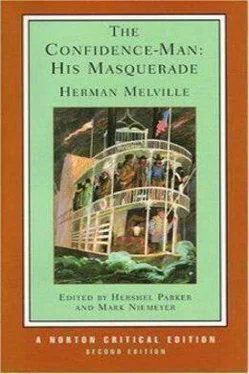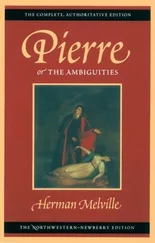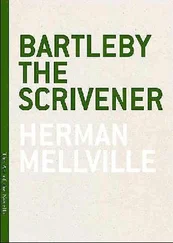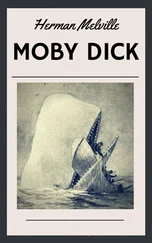"There, barber; will that do?"
"That will do," said the barber, "only now put down your name."
Both signatures being affixed, the question was started by the barber, who should have custody of the instrument; which point, however, he settled for himself, by proposing that both should go together to the captain, and give the document into his hands—the barber hinting that this would be a safe proceeding, because the captain was necessarily a party disinterested, and, what was more, could not, from the nature of the present case, make anything by a breach of trust. All of which was listened to with some surprise and concern.
"Why, barber," said the cosmopolitan, "this don't show the right spirit; for me, I have confidence in the captain purely because he is a man; but he shall have nothing to do with our affair; for if you have no confidence in me, barber, I have in you. There, keep the paper yourself," handing it magnanimously.
"Very good," said the barber, "and now nothing remains but for me to receive the cash."
Though the mention of that word, or any of its singularly numerous equivalents, in serious neighborhood to a requisition upon one's purse, is attended with a more or less noteworthy effect upon the human countenance, producing in many an abrupt fall of it—in others, a writhing and screwing up of the features to a point not undistressing to behold, in some, attended with a blank pallor and fatal consternation—yet no trace of any of these symptoms was visible upon the countenance of the cosmopolitan, notwithstanding nothing could be more sudden and unexpected than the barber's demand.
"You speak of cash, barber; pray in what connection?"
"In a nearer one, sir," answered the barber, less blandly, "than I thought the man with the sweet voice stood, who wanted me to trust him once for a shave, on the score of being a sort of thirteenth cousin."
"Indeed, and what did you say to him?"
"I said, 'Thank you, sir, but I don't see the connection,'"
"How could you so unsweetly answer one with a sweet voice?"
"Because, I recalled what the son of Sirach says in the True Book: 'An enemy speaketh sweetly with his lips;' and so I did what the son of Sirach advises in such cases: 'I believed not his many words.'"
"What, barber, do you say that such cynical sort of things are in the True Book, by which, of course, you mean the Bible?"
"Yes, and plenty more to the same effect. Read the Book of Proverbs."
"That's strange, now, barber; for I never happen to have met with those passages you cite. Before I go to bed this night, I'll inspect the Bible I saw on the cabin–table, to–day. But mind, you mustn't quote the True Book that way to people coming in here; it would be impliedly a violation of the contract. But you don't know how glad I feel that you have for one while signed off all that sort of thing."
"No, sir; not unless you down with the cash."
"Cash again! What do you mean?"
"Why, in this paper here, you engage, sir, to insure me against a certain loss, and―"
"Certain? Is it so certain you are going to lose?"
"Why, that way of taking the word may not be amiss, but I didn't mean it so. I meant a certain loss; you understand, a CERTAIN loss; that is to say, a certain loss. Now then, sir, what use your mere writing and saying you will insure me, unless beforehand you place in my hands a money–pledge, sufficient to that end?"
"I see; the material pledge."
"Yes, and I will put it low; say fifty dollars."
"Now what sort of a beginning is this? You, barber, for a given time engage to trust man, to put confidence in men, and, for your first step, make a demand implying no confidence in the very man you engage with. But fifty dollars is nothing, and I would let you have it cheerfully, only I unfortunately happen to have but little change with me just now."
"But you have money in your trunk, though?"
"To be sure. But you see—in fact, barber, you must be consistent. No, I won't let you have the money now; I won't let you violate the inmost spirit of our contract, that way. So good–night, and I will see you again."
"Stay, sir"—humming and hawing—"you have forgotten something."
"Handkerchief?—gloves? No, forgotten nothing. Good–night."
"Stay, sir—the—the shaving."
"Ah, I did forget that. But now that it strikes me, I shan't pay you at present. Look at your agreement; you must trust. Tut! against loss you hold the guarantee. Good–night, my dear barber."
With which words he sauntered off, leaving the barber in a maze, staring after.
But it holding true in fascination as in natural philosophy, that nothing can act where it is not, so the barber was not long now in being restored to his self–possession and senses; the first evidence of which perhaps was, that, drawing forth his notification from the drawer, he put it back where it belonged; while, as for the agreement, that he tore up; which he felt the more free to do from the impression that in all human probability he would never again see the person who had drawn it. Whether that impression proved well–founded or not, does not appear. But in after days, telling the night's adventure to his friends, the worthy barber always spoke of his queer customer as the man–charmer—as certain East Indians are called snake–charmers—and all his friends united in thinking him QUITE AN ORIGINAL.
Chapter XLIV.
In Which the Last Three Words of the Last Chapter Are Made the Text of Discourse, Which Will be Sure of Receiving More or Less Attention From Those Readers Who Do Not Skip It.
"Quite an original:" A phrase, we fancy, rather oftener used by the young, or the unlearned, or the untraveled, than by the old, or the well–read, or the man who has made the grand tour. Certainly, the sense of originality exists at its highest in an infant, and probably at its lowest in him who has completed the circle of the sciences.
As for original characters in fiction, a grateful reader will, on meeting with one, keep the anniversary of that day. True, we sometimes hear of an author who, at one creation, produces some two or three score such characters; it may be possible. But they can hardly be original in the sense that Hamlet is, or Don Quixote, or Milton's Satan. That is to say, they are not, in a thorough sense, original at all. They are novel, or singular, or striking, or captivating, or all four at once.
More likely, they are what are called odd characters; but for that, are no more original, than what is called an odd genius, in his way, is. But, if original, whence came they? Or where did the novelist pick them up?
Where does any novelist pick up any character? For the most part, in town, to be sure. Every great town is a kind of man–show, where the novelist goes for his stock, just as the agriculturist goes to the cattle–show for his. But in the one fair, new species of quadrupeds are hardly more rare, than in the other are new species of characters—that is, original ones. Their rarity may still the more appear from this, that, while characters, merely singular, imply but singular forms so to speak, original ones, truly so, imply original instincts.
In short, a due conception of what is to be held for this sort of personage in fiction would make him almost as much of a prodigy there, as in real history is a new law–giver, a revolutionizing philosopher, or the founder of a new religion.
In nearly all the original characters, loosely accounted such in works of invention, there is discernible something prevailingly local, or of the age; which circumstance, of itself, would seem to invalidate the claim, judged by the principles here suggested.
Furthermore, if we consider, what is popularly held to entitle characters in fiction to being deemed original, is but something personal—confined to itself. The character sheds not its characteristic on its surroundings, whereas, the original character, essentially such, is like a revolving Drummond light, raying away from itself all round it—everything is lit by it, everything starts up to it (mark how it is with Hamlet), so that, in certain minds, there follows upon the adequate conception of such a character, an effect, in its way, akin to that which in Genesis attends upon the beginning of things.
Читать дальше












